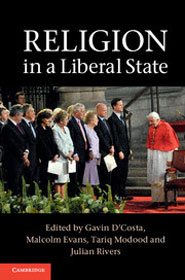Religion in a Liberal State

Religion in a Liberal State
Gavin D’Costa, Malcolm Evans, Tariq Modood, eds.
Cambridge University Press 2013
As religion has become more visible in public life, with closer relations of co-operation with government as well as a force in some political campaigns, its place in public life has become more contested. Fudged compromises of the past are giving way to a desire for clear lines and moral principles. This book brings the disciplines of law, sociology, politics and theology into conversation with one anther to shed light on the questions thrown up by ‘religion in a liberal state’. It discusses practical problems in a British context, such as the accommodation of religious dress, discrimination against sexual minorities and state support for historic religions; considers legal frameworks of equality and human rights; and elucidates leading ideas of neutrality, pluralism, secularism and public reason. Fundamentally, it asks what it means to be liberal in a world in which religious diversity is becoming more present and more problematic.
- New fresh thinking about the role of religion in a liberal democratic state
- Offers readers an interdisciplinary perspective by bringing four disciplines together: politics, law, sociology and theology
- Focuses on Britain and its Christian legacy, unlike many books which focus on Muslims or religious diversity
Contents
Introduction
1. Religion in a liberal state – Raymond Plant
2. The European Court of Human Rights and religious neutrality – Ian Leigh
3. Religion and sexual orientation: conflict or cohesion? – Maleiha Malik
4. Liberal religion and illiberal secularism – Linda Woodhead
5. Moderate secularism in liberal societies? – Derek McGhee
6. Excluded, included or foundational? – Religions in liberal democratic states Veit Bader
7. Justificatory secularism – Cécile Laborde
8. What lacks is feeling: Hume versus Kant and Habermas – John Milbank
9. Arguing out of bounds: Christian eloquence and the end of Johannine liberalism – John Perry
Review
‘Can secularism be combined with liberalism? We would all like to say yes, but how can it be done? One comes away from this collection of insightful and closely-argued essays with a clearer sense of the dilemmas we face in this area, of how the best answers to such dilemmas change with changing social conditions, and of how inadequate some of the widely accepted philosophical solutions are. A rare and valuable intellectual experience.’ –Charles Taylor, Professor Emeritus of Philosophy, McGill University
About the Editors
Gavin D’Costa, Professor of Catholic Theology, Religion and Theology at the University of Bristol
Malcolm Evans, Professor of Public International Law at the University of Bristol
Tariq Modood, Professor of Sociology, Politics and Public Policy, and Director of the Centre for the Study of Ethnicity and Citizenship at the University of Bristol
Julian Rivers, Professor of Jurisprudence at the University of Bristol Law School